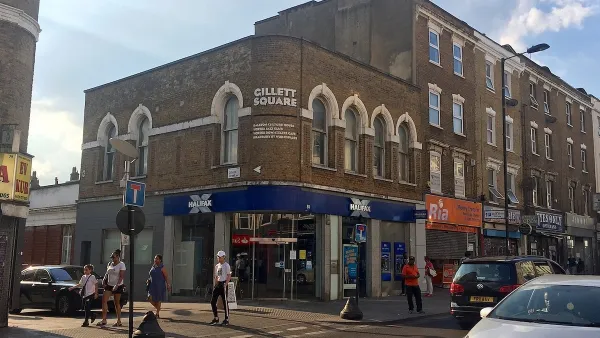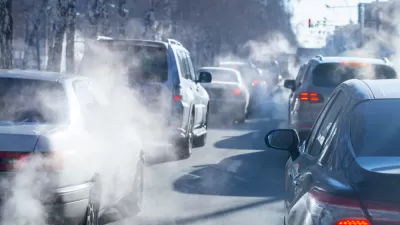Cars, smartphones, and Paris’ air quality crisis.

Unusual atmospheric conditions have led to major air quality problems in Paris, with particulate-matter readings so high that drastic measures have been taken to reduce road traffic. Public transportation was made free this past weekend (even bikesharing and the electric carsharing system Autolib), and an odd/even license-plate scheme was brought in to limit the number of cars and lorries (trucks) on the road. Among other factors contributing to the crisis is the prevalence of diesel-powered cars in France, which are more damaging in terms of particulates than petrol (gasoline) engines.
The blog-o-sphere is alight with thoughts on how the crisis was handled (past tense – for now pollution readings are improving) but I have seen little about the role of smart technology in a 21st Century air quality crisis.
In this short piece, I focus on the odd/even license-plate ban in central Paris – in principle this restricts the number of cars circulating on the streets by half. The classical set of responses to such a classical type of transport policy (I and most readers were not born yet when the first odd/even ban was implemented) are well-established – a shift towards non-car forms of transport, some degree of non-compliance, if it drags on some people eventually buy second cars (typically older and more polluting) with the ‘right’ licence plate, etc.
But “classical responses” don’t necessarily hold in the Age Of The Smartphone – we constantly hear “there’s an app for that” – so what’s the app here?
Putting aside the issues of commercial-vehicle traffic, the most structural disruption is to the lifestyles of people that are the most car-dependent. Some people drive despite there being pretty decent alternatives that can also provide access to the times/places that they go. But other people drive because they believe they have little in the way of alternatives – they’re “car-dependent”, or at least that’s how they see themselves. Of course others will retort that no one should be organizing their lives with such a heavy dependence on a single form of transport, but the reality is that they have done precisely this, they do it because it provides substantial benefits to them and their family, and they will not take kindly to being coerced out of their cars. I’m not taking an ideological perspective here of whether this is good or bad – that’s a much broader discussion. But it’s the reality.
Therefore I think it’s beyond debate that, when an odd/even license plate ban is implemented, there’s great value (£££/$$$) to be unlocked by flexibly matching “car-dependent” drivers with other cars that have the “right” license plate for any given day.
Time was that to deliver this service you’d have to own a fleet of cars, and you could then rent them out on an alternating-day basis to drivers in need. If you do it right, and the ban persists, it might conceivably be a profitable business.
But that’s so 20th Century – today all that’s required to match drivers with cars is an app. You’d need a virtual marketplace that matches between these groups on a short-term, flexible basis. And you’d need an insurance product that lets person ‘A’ rent their car to person ‘B’ for a day without worrying whether they’d be liable in case person B damages it (or damages something or somebody else with it). How much would “car-days” be transacted for? That’s a matter for supply and demand to sort out.
Now that I’ve spelled it out, you’ve probably cottoned on that this type of app-centric network already exists – we know it as peer-to-peer carsharing, and France is undisputedly one of the world leaders.
So those are my two cents on Paris’ air quality crisis – vive l’autopartage P2P. Would this be a good thing? That’s an interesting discussion, let’s pick it up in the comments section. But if the authorities decide it’s not a good thing, what’s the recourse – ban P2P carsharing? Have the NSA disable the app for the duration of the crisis? Require that cars can only be driven by the registered owner – if so how would that possibly be enforced – not by police looking at license plates on radial roads, as Paris did, that’s for sure.
Scott Le Vine, AICP is a research associate in transport systems at Imperial College London and a trustee of the shared-mobility NGO Carplus, which serves as the UK’s shared-mobility trade body. He authored the 2012 study "Car Rental 2.0: Car club [carsharing] innovations and why they matter". This post is cross-posted at the www.racfoundation.org and www.planetizen.com.

Maui's Vacation Rental Debate Turns Ugly
Verbal attacks, misinformation campaigns and fistfights plague a high-stakes debate to convert thousands of vacation rentals into long-term housing.

Planetizen Federal Action Tracker
A weekly monitor of how Trump’s orders and actions are impacting planners and planning in America.

In Urban Planning, AI Prompting Could be the New Design Thinking
Creativity has long been key to great urban design. What if we see AI as our new creative partner?

King County Supportive Housing Program Offers Hope for Unhoused Residents
The county is taking a ‘Housing First’ approach that prioritizes getting people into housing, then offering wraparound supportive services.

Researchers Use AI to Get Clearer Picture of US Housing
Analysts are using artificial intelligence to supercharge their research by allowing them to comb through data faster. Though these AI tools can be error prone, they save time and housing researchers are optimistic about the future.

Making Shared Micromobility More Inclusive
Cities and shared mobility system operators can do more to include people with disabilities in planning and operations, per a new report.
Urban Design for Planners 1: Software Tools
This six-course series explores essential urban design concepts using open source software and equips planners with the tools they need to participate fully in the urban design process.
Planning for Universal Design
Learn the tools for implementing Universal Design in planning regulations.
planning NEXT
Appalachian Highlands Housing Partners
Mpact (founded as Rail~Volution)
City of Camden Redevelopment Agency
City of Astoria
City of Portland
City of Laramie






























